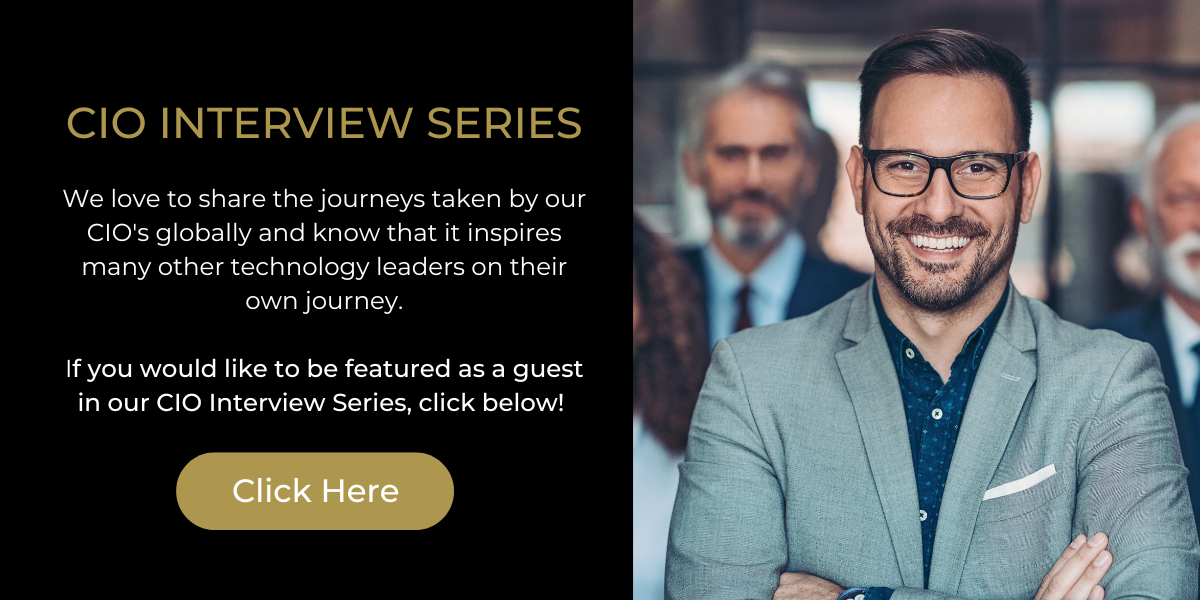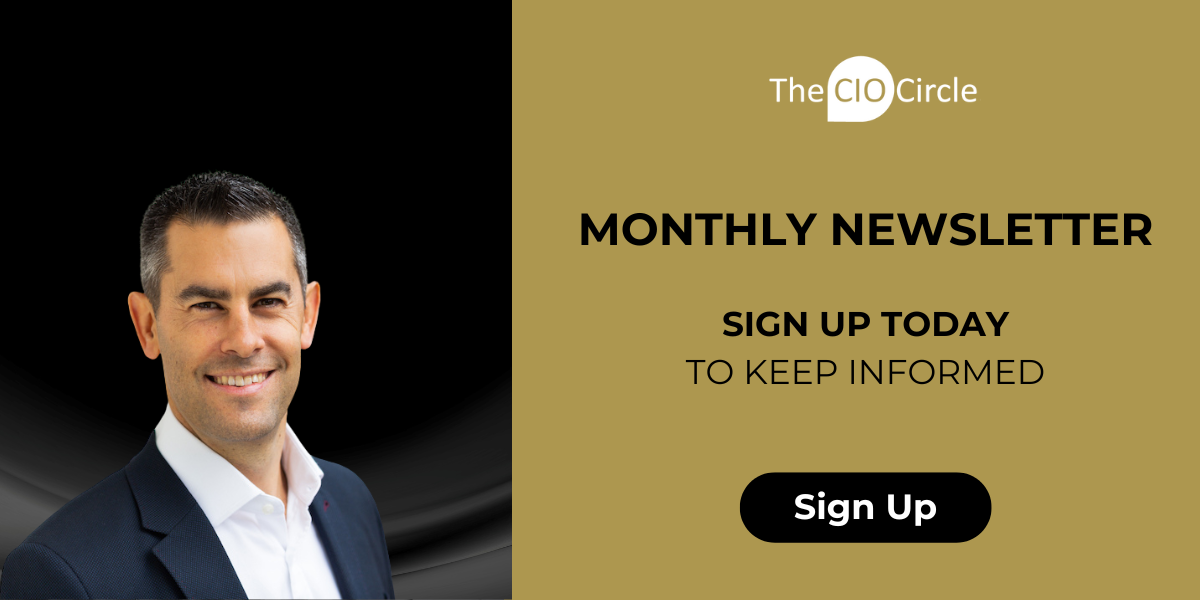CIO GE Edison Works at General Electric
Can you please provide a little introduction about yourself
Let’s start with, “What is GE Edison Works?” GE Edison Works is a P&L within GE Aerospace that focuses on designing and developing the next generation warfighter. I am currently based out of Cincinnati, Ohio, USA, and am the CIO of GE Edison Works, leading a digital team of 150+ amazing IT professionals who support the end-to-end critical infrastructure (from data center to networking to engineering applications) to compliantly scale the P&L.
What has your journey to your position been like? What path have you taken?
I’ve spent my entire career at GE. Fourteen years ago, after completing my undergraduate degree in Industrial and Operations Engineering with a minor in Economics from the University of Michigan, I joined GE as part of a leadership program that is now called DTLP (Digital Technology Leadership Program). I completed four diverse six-month rotations, ranging from patching 300k global devices to iPhone application development.
From there, I took roles of increased responsibility, starting with being an individual contributor, to leading contractors, and then to leading increasingly larger teams in a wide range of fields, including custom application development, big data and streaming analytics, and cloud migrations, which then led to my current role as CIO of GE Edison Works. At the end of each role, I looked for the next bigger challenge that both excited and scared me.
Here is my career profile that visualizes my journey.
Has it always been your vision to reach the position you’re at? Was your current role part of your vision to become a tech leader?
One of my first memories at GE was at a welcome BBQ. I remember being in awe with the number of intelligent people from diverse backgrounds and experiences. Also, I was struck by how real the people were: they weren’t robots; they were smart people who were passionate about their work and life out of the office. I ended up talking to a CIO for 30 minutes about life and GE, but honestly mostly about sports. Driving home that day, I thought that it would be pretty amazing to be that executive leader one day, who still could talk sports with a 20-year-old while simultaneously being a transformational digital leader.
From that BBQ forward, I worked my way into bigger roles, with a simple plan: stay customer-focused and work really hard (which will improve your brand); with that, good things will happen. And it paid off: 12 years after that BBQ, I did become an executive at GE with the opportunity to lead my current great team (and yes, I did complete the circle and talk sports and life with a new hire earlier this month).
Have you had a role model or mentor that has helped you on your journey?
I’ve worked with so many great people, so it’s tough to pick just one, but if I would have to pick, I’d pick my dad. From an early age, he showed me the importance of hard work, being overly logical and prepared, and being trustworthy. If you do all those things, in the long run, it will work out. Those have been the core values that I’ve put into place and that have driven success in my career thus far.
How do you see the role of the technology leader evolving over the next 5 years?
The biggest evolution is going from backroom function to critical partner. When I started in IT, IT was a backroom function, we were just a fixed cost to run the business that the CEO had to accept. Over the years, technology has gotten more into the forefront and looked at to help drive top-line revenue and bottom-line productivity.
The simplest way to become a critical partner is a two-step process. First, get a seat at the table; second, “leverage that seat” at the table to understand the business and be that partner.
Across the industry, IT leaders are starting to have a seat at the table to help transform the business. As a personal example, about six months ago, I was invited into our P&L’s weekly operating review. At that point, I realized that my team had made it and successfully completed step one. In moving on to step two now that I’m in the room, I need to use my seat at the table to proactively and intentionally help use technology to advance the business to increase revenue and productivity.
What skills do you think leaders of the future will need in order to thrive?
I could pick any game-changing technology (e.g., AI, automation, cloud), but I think that the human side is a critical piece that is often overlooked. You need to attack the human side from both ends of the spectrum. First, you need to ensure that your IT professionals have the right culture of compliance, focus, teamwork, empowerment, and delivery. Second, for the customer that you are enabling, you need to ensure that your team members truly knows the customer that they are enabling and are empowered to deliver for them. If you attack both sides of the spectrum, then you will have a strong foundation for success.
How do you keep current with new skills, technologies and personal development?
The one constant in the digital age is that you need to continuously learn--and learn how to learn. When I went to college, there wasn’t a class on ‘big data’, but a few years after college, I was leading a big data team. If I didn’t continuously learn, there was no way I’d been successful in that role.
On learning, I think of it in two types. 1-Learning to tackle a specific problem or technology; 2-generic learning to just become a better leader and technologist. I tackle the two types differently, as explained below.
Specific Problem
To tackle a specific problem, for example, I had a request from our CDO to move all of our applications to Azure. I couldn’t even pronounce Azure 😊. So what did I do? First, I made time (which is a critical, often overlooked step), and second, I set up meetings to better understand the problems (both from a technology and business perspective) and then I attacked the problem by getting on a plane to go to an Azure conference, got my hands on an account, and played around on Azure. From there, I was able to better lead my organizations transformation.
Every Day Learning
To constantly learn, I’m an avid podcast listener: I listen to them when I drive, work out, mow the lawn, etc.
A few that I really like are:
- HBR Ideacast - A weekly podcast featuring the leading thinkers in business and management.
- Acquired – Deep dives on company’s origin stories.
- Kain Nexus – Lean and Continuous Improvement.
- Master of Scale – Netflix founder talking how to scale businesses.
I’d say that once a month I share a podcast with a team member who I think would resonate with the podcast. This is a great way to drive the right culture across your organization.
What do you see as the next leap in technology that will impact your business or industry in particular?
Model-Based System Engineering (MBSE) and Model-Based Engineering (MBE) are being pushed by the US Air Force to get to market faster and better tightly integrate partners and functions. We need to have better and more standardized digital connections if we are all going to scale. I’d recommend everyone read Dr Roper’s ‘Green Paper’ on how to transform digitally.
Candidly, I’m sure that AI will disrupt our business in many ways, though I am still trying to get my head around it. For my team’s use cases, I’ve worked with it a bit and haven’t seen it add much value over physics and statistics-based models. However, I see the disruption coming sooner rather than later for the right use cases.
"Every hour of every day, you have a choice of where you spend your time, treat that time and opportunity like gold."
If you were mentoring a leader of the future, what advice or guidance would you give to help them on their way?
Every hour of every day, you have a choice of where you spend your time, treat that time and opportunity like gold.
One of the biggest flaws that I see great leaders fall into (and I’m one of them) is a ‘calendar trap’. They follow their calendar and go from meeting to meeting to meeting. However, they don’t take a step back and say, should we even be having these meetings? If so, do I need to be in them? You need to strategize and proactively plan how you spend your time. Setting your personal strategy and mapping your calendar is a process called ‘leader standard work’. Don’t forget that the higher you are in the organization, the more time you should spend on innovation and less time on tactical (see Kaizen flag). You will be shocked to see how much impact you make if you proactively control your calendar.
Is there anything in particular that you would still like to achieve in your career or what is the next step on your journey?
Since I achieved my goal of becoming an executive at GE who could still talk sports, it is a logical time to take a step back and consider the goals for the next chapter of my career. I still want to solve tough problems, but I do need to better define the type of problems. Should I continue my growth at GE or is it time to leverage my expertise outside of GE? Move to a new industry? Move to a smaller company? Be closer to the customer? To the business? These are the questions that I’m pondering. At the end the day, my strategy will be the same that got me here: to stay customer-focused and work really hard, from which good things will happen.
If you could change one thing in the world, what would it be?
A single time zone. For two reasons:- Better work-life balance: It’s hard enough to have work-life balance in a single time zone. During a previous role, I had direct reports from China to Istanbul to California; the day seemed to never end and it was very difficult to draw boundaries.
- Productivity and more access to talent: Having everyone in one-time zone will enable us to get the best talent from anywhere in the world and still have productivity boost of asynchronous conversations.
Sadly, since this isn’t possible, we need to continue to use our digital tools to collaborate globally!
A big thank you to Bob Kahn from General Electric for sharing his journey to date.
If you would like to gain more perspective from Tech Leaders and CIOs you can read some of our other interviews here.
July 19, 2023


